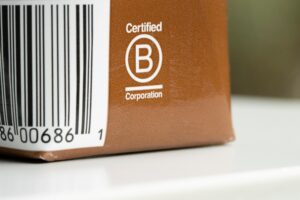
This is the first in a three-part editorial series where Will Brookes, CEO at Raconteur, will document the company’s quest to certify as a B-Corp, hoping to inspire more SME organisations to also take the plunge.
If you’re not already familiar, B Corporation (or B Corp) is a private certification system which focuses on the social and environmental performance of for-profit companies. It is administered by B Lab, a global non-profit organisation which believes that the world’s biggest challenges “cannot be solved by governments and non-profits alone”.
B Lab was founded in 2006, with the first 82 companies certifying in 2007. Fast forward to 2022 and there are now more than 4,500 certified companies globally. In the UK, there are more than 900, spanning 50 industries or more. While there is clear momentum building, this still means only around 0.35% of UK companies employing more than 10 people are certified (based on 2021 private sector figures).
With companies like The Guardian, Ben & Jerry’s, Danone and Innocent Drinks already making the grade, you could be forgiven for thinking B Corp status is something only bigger brands can aspire to. But there are no size limits on who can certify – even sole traders can, as long as they have been operating for 12 months or more. I recently wrote an article arguing a business is never too small to focus on DE&I, and I believe the exact same thing applies to a business’s environmental and wider social responsibilities. If businesses ignore these challenges, they are likely to become more complex and ultimately cost more to fix as the organisation grows. It’s better to start small, or, if you’re beyond that point, start today.
At the time of writing, Raconteur employs 75 people and has recently made the commitment to certify as a B Corp – one of our key strategic objectives in the next 12 months. This is driven by several factors. Firstly, and perhaps most importantly, it’s the right thing to do. As a business with huge growth ambitions, we must take our responsibilities seriously and ensure we make a positive impact on the world. Secondly, becoming a B Corp is something all employees can get behind and work towards, alongside their normal day-to-day duties. The process of certifying, and hopefully the ultimate accreditation, should further boost employee engagement and help with talent attraction and retention. Finally, it should build trust with our consumers, communities, and suppliers – and enhance our brand awareness.
Despite a relatively small number of companies making the grade to date, over 100,000 companies have registered and started the B Corp certification process. Achieving B Corp status requires high standards. To qualify, a company must score more than 80 points from a detailed questionnaire framework which delves into its policies and practices around governance, employees, community, environment and customers. The assessment must be repeated every three years to ensure long-term commitment and retain certification.
After making the commitment to certify, we started to think about the best and fastest way of achieving it. While it is important for Raconteur’s leaders to support and be involved in the process (indeed, some items can only be achieved by company directors), we also saw an opportunity to involve our wider workforce. B Corp certification covers a range of business practices, meaning employees across experience levels would get insight and exposure to the running of the business. So, it can be a valuable learning experience for more junior staff.
We gave a companywide presentation about our intentions, and what it would likely involve, asking staff to volunteer if they would like to play an active role in helping Raconteur certify. Around 20% of our staff put their names forward, from which we randomly selected an initial team of six to sit alongside myself and our COO on our “B-Team”. Raconteur’s “B-Team” will collectively complete the B Corp assessment and be responsible for researching information and driving change around the specific items covered by the assessment. We’ll rotate the team every six months so that others can take part, learn more about how our business operates and have a positive impact on the company.
We’re submitting our initial survey next week, so we’ll disclose our initial score, the areas to improve and the changes we are making within the business to get closer to that all important score of 80, in the next article in this series. While we’ve no doubt that certifying as a B Corp will be a big challenge, it’s one we’re thrilled to take on.
Read more:
The journey to B-Corp






